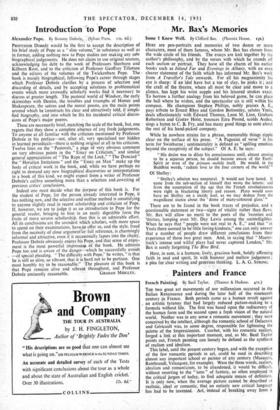Introduction to Pope
Alexander Pope. By Bonamy Dobree. ..(Sylvan Press. i2s. 6d.) - PROFESSOR DOBREE would be 'the first to accept the description of his brief study of Pope as a "slim volume," in substance as well as in format, adding nothing new to Pope studies nor making any ndrw biographical judgements. He does not claim to use original sources, acknowledging his debt to the work of Professors Sherburn and Kilburn Root, and tothe criticism of Professor Geoffrey Tillotson and the editors of the volumes of the Twickenham Pope. The book is maiely biographical, following Pope's career through stages which Professor Dobrde clarifies by a process of selection and discarding of details, and by acceptins solutions to problematical events which more avowedly scholarly works find it necessary to discuss at greater length. The pastoral world of Windsor, the early skirmishes with Dennis, the troubles and triumphs of Homer and Shakespeare, the satires and the moral poems, are the main points around which he 'constructs his clear and attractively told, if simpli- fied biography, and into which he fits his incidental critical discus- sions of Pope's major poems. « , These are necessarily brief, matching the scale of the book, but, one regrets that they show a complete absence of any fresh judgements. To anyone at all familiar with the criticism mentioned by Professor Dobree in his preface—not, after all, very specialised nor hidden in learned periodicals—there is nothing original at all in his criticism. Twelve lines on the "Pastorals," a page Of very obvious comment on very obvious points in the "Essay• on Criticism," and similar general appreciations of "The Rape of the Lock," "The Dunciad " the "Horatian Imitations" and the "Essay on Man" make up the body of critical work in the book, and, while we have perhaps no right to demand any new biographical discoveries or interpretations in a book of this kind, we might expect from a writer of Professor Dobree's calibre something more than a selection and ewriting of previous critics' conclusions.
Indeed one must decide what the purpose of this book is. For the student of Pope, for the person already interested in Pope, it has nothing new, and the selective and outline method is unsatisfying to anyone slightly read in recent scholarship and criticism of Pope. If, however, we are to judge it as an introduction to Pope for the general reader, bringing to him in an easily digestible form the fruits of more serious scholarshih, then this is an admirable effort. All its conclusions are the soundest which scholars, with more space to spend on their examinations, have, to offer us, and the style, freed from the necessity of close argumentlor full reference, is charmingly informal and attractive, even if it occasionally lapses into the chatty. Professor Dobree obviously enjoys his Pope, and that sense of enjoy- ment is the most powerful impressiop of the book. He admires Pope too and is aware of the danger—which he successfully avoids —of special pleading. "The difficulty with Pope," he writes, "is that he is still so alive, so vibrant, that it is hard not to be partisan. One must humbly try to be reasonable." The pleasure of this book is that Tope remains alive and vibrant throughout, and Professor






































 Previous page
Previous page